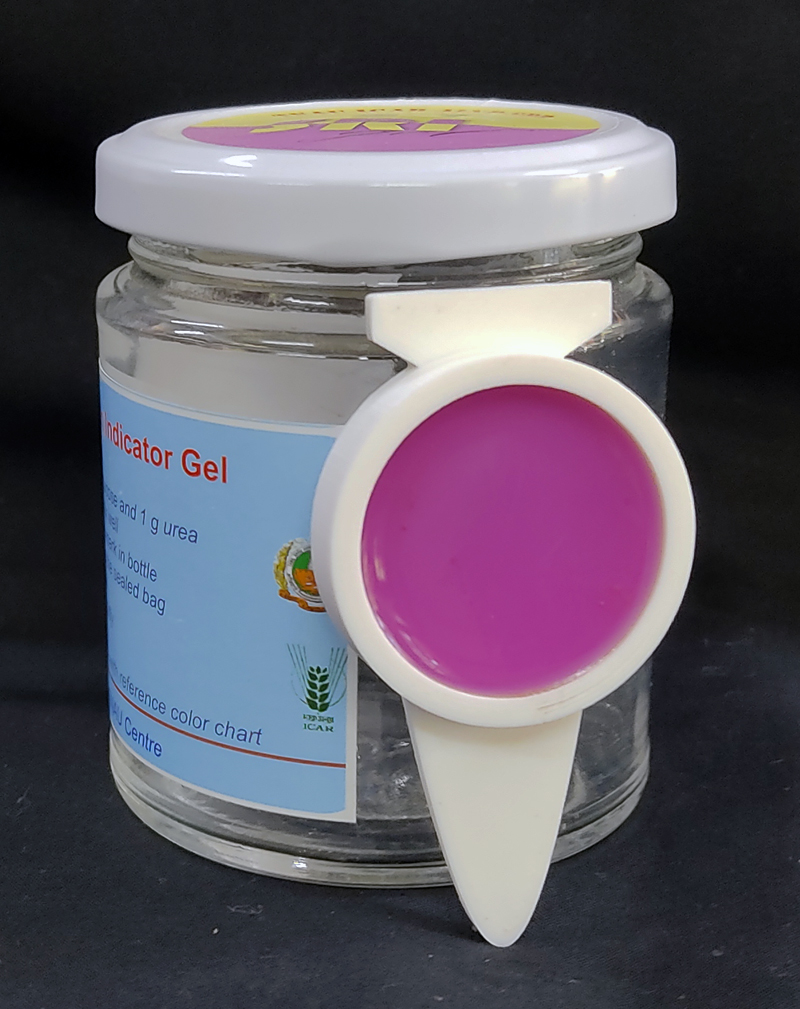Zinc solubilizing bacterial Biofertilizer [2022-Technology]
Soil zinc deficiency leads to the yield loss of several food crops, including rice, wheat, maize, and sorghum, and it also causes malnutrition due to insufficient Zn in food grains. The zinc solubilizing bacterial strains were developed as carrier-based and liquid biofertilizers to ensure the crop’s zinc nutrition. The zinc solubilizing bacteria can enhance the soil’s available zinc by producing 2-ketogluconic acid, thereby solubilizing the insoluble form into a soluble form. The inoculation of ZSB can improve the Zn uptake of rice and also enhance the Zn-use efficiency of fertilizer-applied Zn (zinc sulfate). The four-year evaluation in various agro-ecological zones of Tamil Nadu confirmed that the ZSB biofertilizer can increase the yield increase of 17-20% compared to no-Zn control. ZSB biofertilizer also ensures Zn sufficiency in rice grains (25 mg/kg). Using ZSB biofertilizer reduced the zinc sulfate application to 50% in rice. By adopting this technology, rice farmers can get an additional benefit of about 250-400 kg/ha.
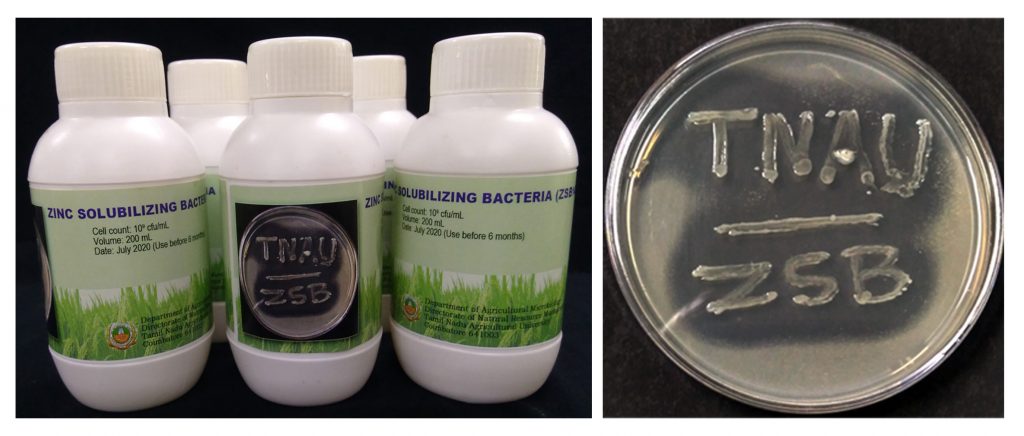
Nodule-associated Plant Probiotics for blackgram [2022-Technology]
The nodule-associated plant-growth promoting yeast, Candida tropicalis VYW1, and bacterium, Paenibacillus taichungensis TNEB6 were developed as coinoculants with Rhizobium and mycorrhiza for enhancing growth and yield of blackgram. Seed inoculation of these three inoculants at 125 ml /ha of seed and mycorrhizal fungal spore at 1 gram per kg had been standardized as inoculant technology. These co-inoculants can survive under drought conditions and produce several plant growth hormones and drought mitigating molecules. These plant probiotic strains enhance the Rhizobial nodulation and occupancy, nutrient upkate, plant growth promotion and conferred drought mitigation. The application of these plant probiotic strains along with rhizobium and mycorrhiza enhanced 14% higher yield than recommended biofertilizer application in blackgram.
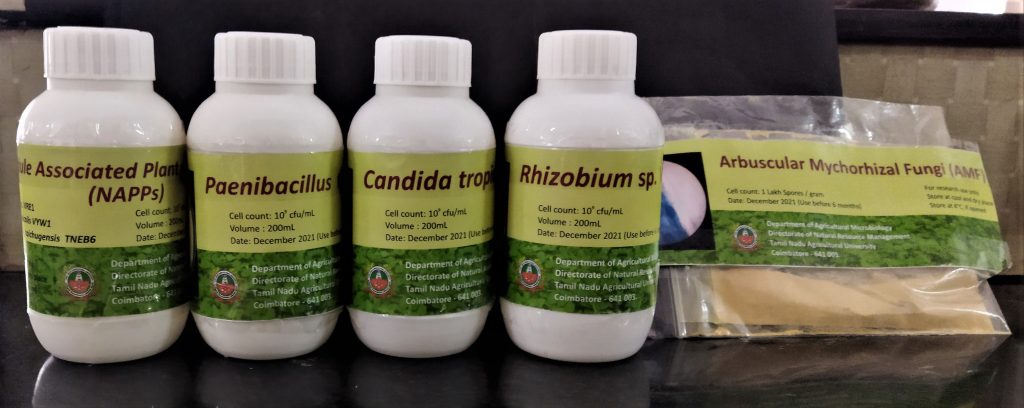
Stage-Specific Inoculants for Rice [2023 Technology]
The Stage-specific inoculant technology introduces the necessary microbial inoculant specific to the crop’s growth stage to maximize the colonization and efficiency for maximum yield. The rice crop needs N and P in the early stage, which can be supplemented through nitrogen-fixing and phosphorus-solubilizing inoculants; growth-promoting substances at active growth and flowering stage (through PGPRs and PPFM) and K at the flowering stage (K-releasing bacteria). The Stage-specific inoculant contains a pack of biofertilizers with six strains: Azospirillum, Azotobacter, Phosphobacteria, Potash bacteria, Pseudomonas, and PPFM to ensure nutrients, growth hormones, and biotic and abiotic stress mitigation throughout the rice crop. Reduction of 25% recommended dose of chemical fertilizers; 10-15% yield increase with additional revenue of Rs. 5000 per acre are the benefits of this technology. Stage-specific inoculant is a potential eco-friendly bioinput for organic rice cultivation.
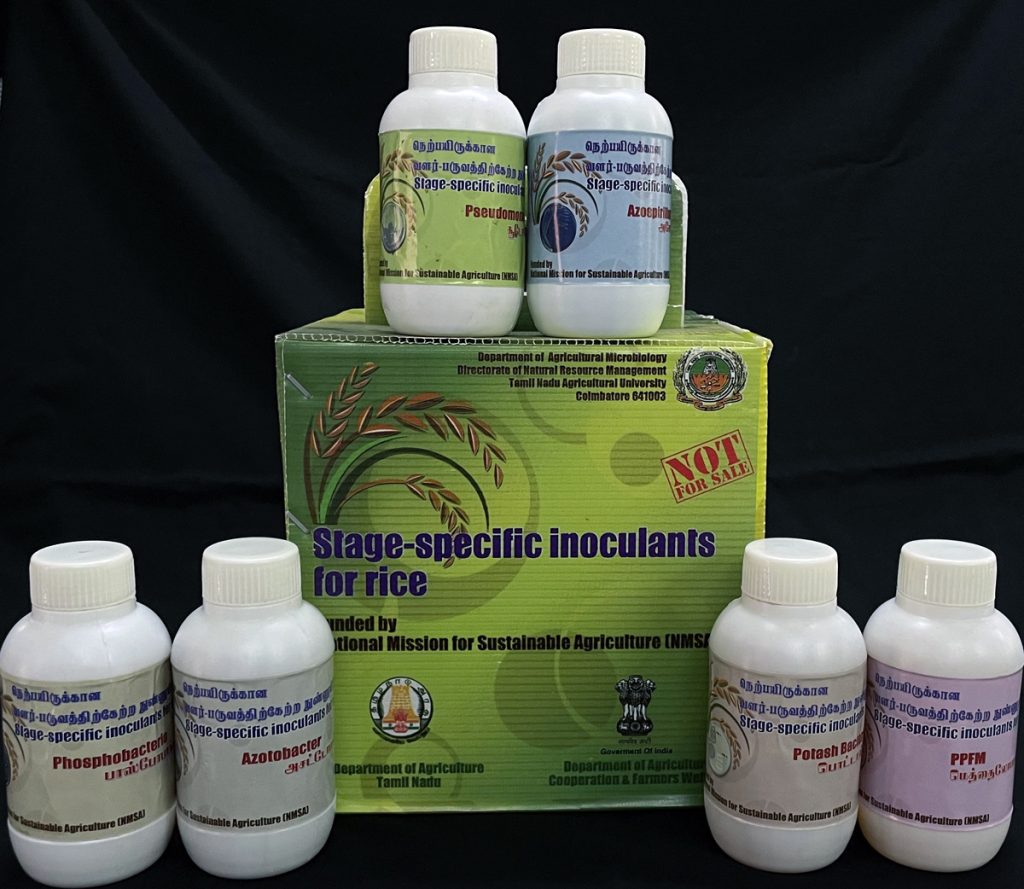
Bacillus altitudinis FD 48 for drought, plant growth and yield in rice [2023 Technology]
The phyllosphere bacterium Bacillus altitudinis FD48 is a growth enhancer, able to mitigate drought by ACC deaminase, produce trehalose under abiotic stress, and possess antagonistic activity. FD 48 showed many remarkable genes for nutrient solublization like N, P, and S metabolism, Fe and siderophore uptake system, osmolyte production, cold and heat shock proteins. FD48 plays a significant role in improving plant growth under stress. Seed treatment of Bacillus altitudinis FD48 @ 125 mL ha-1 and foliar spray 500mL ha-1 of FD 48 cells (108cfu mL-1) at 30 & 50 DAS (Tillering) showed enhanced plant growth and yield increase in rice plants under irrigated and induced drought stress condition. FD 48 priming in rice as seed treatment and foliar spray enhanced the yield under both irrigated (16%) and drought stressed (8.5%) conditions over recommended dose of fertilizers (75% RDF).
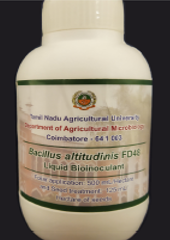
Soil Respiration Indicator (SRI) gel probe to assess the soil health [2024 Product]
Soil respiration indicator (SRI) gel is the probe that will assess the substrate-induced respiration of soil, and thereby the soil health status. Soil samples amended with glucose (5%) and urea (1%) and transferred to the given air-tight glass bottle. Then, the color-changing gel pad has to be inserted in the soil with sufficient moisture. Under air-tight incubation conditions, the gel changes its color from pink to magenta, lavender, orange, and yellow, after 6-8 hours, depending upon the soil respiration rate. The color change index (scale of 0 to 6) can be referred with the given reference color chart and based on the index number, the soil health can be grouped as ‘low’, ‘medium’, and ‘high’. This probe is a simple, quick, and cost-effective device for soil health assessment. This device aids the farmers to check soil’s health by themselves without any instrumentation.
